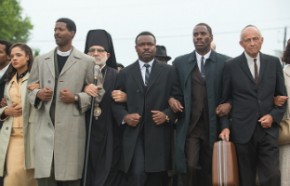Epic march

All eight movies nominated for best picture in this year’s Oscar race are about men, and all but one of them are about white men. Some are ordinary men living ordinary lives, as in the coming-of-age masterpiece Boyhood. Many are exceptional men in exceptional circumstances, as in American Sniper, The Theory of Everything, Whiplash, and The Imitation Game. Others are eccentrics who win our hearts with their fervent resistance to normalcy, as in Birdman and The Grand Budapest Hotel. But in a year of collective protest and activism, of public debate about the meaning of our social union, these stories of lone heroes seem out of touch with the times.
The one exception on the list is Selma, about the civil rights march from Selma, Alabama, to the state capital in 1965 to secure voting rights for black citizens. Selma is also about a great male leader, Martin Luther King Jr., and actor David Oyelowo highlights his brilliance, charisma, and leadership. But the film is not just the story of King’s life, and not just the story of one particular campaign. Rather, it captures something more elusive in our fictions and in our politics: the feeling and dynamic of a collective movement.
Read our latest issue or browse back issues.
The film opens with King’s acceptance of the Nobel Peace Prize in 1964, a great set piece for a “great man” story. But after quickly emphasizing King’s singularity and international acclaim, the film places him back within the tussle of an unwieldy movement. King’s voice becomes one of many in the Southern Christian Leadership Conference who are debating what issues the group will pursue and what tactics they will employ.
The film captures the emotional fabric of collective organizing. In one scene SCLC organizers are sprawled around a living room late in the night discussing the impediments to black voting in the state. The scene explains what black people were facing when they tried to register to vote: voucher requirements, poll taxes, intimidation tactics, and farcical registration exams. But the scene also evokes the rare moments when camaraderie and common purpose are transformed into the fixed resolve and unified action of a movement.
The viewer follows the organizers as they interact with each other in prison cells, around kitchen tables, and on long car rides through rural Alabama. The scenes reveal the ferocious intellects, personal sacrifices, and friendships that sustained and guided the SCLC.
Of course, the SCLC wasn’t the only organization active in the civil rights movement. At the Selma march, grassroots organizers with the Student Nonviolent Coordinating Committee bristled at the arrival of the famous leader and the media attention he brought. It would be easy to caricature these debates as being between young and old (though King was himself only 35 years old at the time) or between grassroots and established visions of activism. Instead the film humanizes the risk of compromise that each group feels when working together. As a united force, one action may achieve more than smaller actions alone, but that decision to unite is fraught with uncertainty, even when the aims are shared.
The film makes the viewer aware of other civil rights leaders who are often obscured in our national elevation of King. Many are rendered with great humanity and pathos—including Ralph Abernathy (Colman Domingo), James Orange (Omar J. Dorsey), and Diane Nash (Tessa Thompson). At the same time the film makes clear that the choice of King as front man for the movement was both a strategy of the movement’s leaders and a response to the liberal political establishment’s choice of King as the leader they are willing to work with. As Lyndon Johnson (Tom Wilkinson) says, he’d rather have King as the public face of civil rights than “a militant like Malcolm X.”
It’s easy for a movie about King to be a simple history lesson. Not Selma. The movie feels “of our own moment.” It is impossible to watch people taking to the streets to demand change in 1965 and not think of Ferguson or New York City in 2014. The bill of promises unfulfilled is still coming due.
The current political climate makes Selma not just a historical reminder of the roots of collective complicity in racial injustice and white supremacy but a powerful film that shows how personality, energy, motivation, and mission coalesce to create lasting change.
Selma is a rare delight as a work of art. It is also an emotional guide to the fragile work of collective action. For that reason it just might be the most important movie this year.






